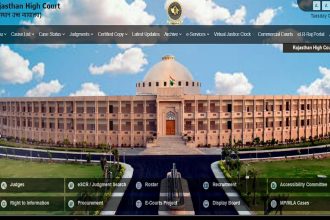
New Delhi: The Supreme Court on Tuesday upheld the constitutional validity of the Uttar Pradesh Board of Madrassa Education Law, 2004 and set aside an order of the Allahabad High Court, which declared the Uttar Pradesh Madarsa law as “unconstitutional” and violative of the principle of secularism.
A bench Chief Justice of India (CJI) DY Chandrachud and Justices JB Pardiwala and Manoj Misra said that the Madarsa Act is consistent with the positive obligation of the state to ensure that students studying in recognised Madarsas attain a level of competency which will allow them to effectively participate in society and earn a living.
Provisions seeking to regulate higher-education degrees, such as Fazil and Kamil, unconstitutional: Apex Court
The bench, however, said that the provisions of the Madarsa Act seeking to regulate higher-education degrees, such as Fazil (post-graduate degree) and Kamil (undergraduate degree), are unconstitutional as they are in conflict with the University Grants Commission (UGC) Act.
A state legislation cannot seek to regulate higher education in contravention of provisions of UGC Act: Apex Court
The UGC Act governs the standards for higher education and a state legislation cannot seek to regulate higher education, in contravention of the provisions of the UGC Act, the bench said.
“The Madarsa Act to the extent to which it seeks to regulate higher education, including the ‘degrees’ of Fazil and Kamil, is beyond the legislative competence of the state legislature since it conflicts with section 22 of the UGC Act. Entry 25 of List III, pursuant to which the Madarsa Act has been enacted, has been expressly made subject to Entry 66 of List I. The UGC Act governs the standards for higher education and a state legislation cannot seek to regulate higher education, in contravention of the provisions of the UGC Act,” the CJI-led bench said.
Only infirmity lies in those provisions which pertain to higher education, namely Fazil and Kamil: Apex Court
The apex court, which disagreed with the High Court on the question of whether the entire Madarsa Act suffers from an infirmity on the principle of secularism and other contentions, said that the only infirmity lies in those provisions which pertain to higher education, namely Fazil and Kamil.
“These provisions can be severed from the rest of the Madarsa Act. The purpose behind the Madarsa Act was to remove the difficulties in running the Madarsas, improve their merit and provide adequate facilities to students studying in these institutions. The purpose was not limited to only regulating Fazil and Kamil, and the legislature would have still enacted the statute if it were aware that the portions pertaining to higher education were invalid,” the top court said.
If provisions relating to higher education are separated, Act can continue to be enforced: Apex Court
The bench added, “Further, if the provisions relating to higher education are separated from the rest of the statute, the Act can continue to be enforced in a real and substantial manner. On an examination of the Madarsa Act, it is clear that prescribing the instructional material, conducting exams and conferring degrees for Fazil and Kamil were only a part of the functions of the Board. The severance of these functions from the Board does not impact its entire character. Thus, only the provisions which pertain to Fazil and Kamil are unconstitutional, and the Madarsa Act otherwise remains valid.”
Academic education in Madarsas is broadly divided into four levels
Academic education in Madarsas is broadly divided into four levels: (i) Tathania (equivalent of elementary classes I to V); (ii) Fauquania (equivalent to upper elementary classes VI to VIII); (iii) Maulvi or munshi (equivalent to a certificate of secondary school or Xth standard); and (iv) Alim (certificate of senior secondary level examination or XIIth standard). A few Madarsas also award certificates of Kamil and Fazil.
The State of Uttar Pradesh stated in its affidavit before the top court that Kamil and Fazil degrees awarded by Madarsas are not recognised as alternatives to graduate and post-graduate degrees respectively.










